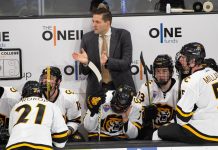Former Boston College star John Cunniff and the entire 1980 U.S. Olympic team are among the latest inductees to the U.S. Hockey Hall of Fame in Eveleth, Minn.
They will be joined by Richard Dougherty, a former standout at Minnesota, and long-time NHL stars Pat LaFontaine and Mark Howe.
The 1980 squad, a team filled with college stars of the day, defeated the mighty Soviet Union on its way to just the second gold medal in U.S. Olympic hockey history. Along the way, they captivated the nation, and were named 1980 Sportsmen of the Year by Sports Illustrated. They are the second team so honored, following the 1960 U.S. Olympic gold medal team.
The now legendary names included the likes of former Minnesota coach Herb Brooks, and players Mark Johnson of Wisconsin, captain Mike Eruzione and goalie Jim Craig of Boston University, and Neal Broten of Minnesota.
Cunniff was an All-American at Boston College in 1965 and 1966 and a member of the 1968 U.S. Olympic team. He was most recently in the New Jersey Devils organization as head coach, assistant coach, and head coach of the Albany minor-league affiliate for 13 seasons, before he passed away in May 2002 after a battle with cancer. He also had two decades of experience helping to coach various national teams, including the 2002 Olympic team as an assistant.
Dougherty, 70, was a star for Minnesota in the ’50s, and stands 10th on the Gophers’ all-time scoring list. He had 42 goals in the 1953-54 season, including four in the national semifinal against Boston College, as Minnesota reached the NCAA finals. After playing for the U.S. Olympic team in 1956, Dougherty played eight seasons of minor-league hockey before retiring.
He turned down an opportunity to play in the 1960 Olympics, where the United States won the gold medal.
“I was quite surprised, really,” Dougherty said of his reaction to learning the news last weekend. “I think [former Minnesota teammate] John [Mayasich] had a lot to do with me being in the hockey hall of fame.”
Mayasich doesn’t see it the same way: “I don’t think I ever scored a goal of his,” he joked.
“I’m one that appreciates what he contributed,” Mayasich continued. “This recognition is long overdue.”
Howe is the son of the legendary Gordie Howe, and played 22 seasons in the NHL. At age 16, Howe played on the U.S. Olympic team in 1972. He was a forward in the World Hockey Association, playing alongside brother Marty and father Gordie for the Houston Aeros. When the league folded, he went to the NHL where he made his mark as a defenseman, where he was a three-time First Team All-Star and three-time runner up for the Norris Trophy as the NHL’s top blueliner. He also made three trips to the Stanley Cup finals, two with Philadelphia (1985 and ’87) and one with Detroit (’95), though his teams lost all three.
LaFontaine played 15 NHL seasons, and stands sixth among Americans in career points with 1,013 and third in goals with 468. His NHL career started with the New York Islanders before he went to Buffalo and then to the New York Rangers, where it was cut short by concussion problems. LaFontaine was a member of the 1984 and 1998 U.S. Olympic teams, and was on the gold-medal winning team at the 1996 World Cup of Hockey. He played amateur hockey in the Quebec Major Junior League for Verdun, where was Canadian Hockey League Player of the Year in 1982-83.


